Analysis of Employment Contracts: Advantages and Disadvantages for HR
VerifiedAdded on 2023/01/06
|11
|3724
|75
Report
AI Summary
This report delves into the realm of employment contracts, comparing and contrasting different types, including permanent, part-time, zero-hour, and fixed-term contracts. It meticulously analyzes the advantages and disadvantages of each contract type for both employees and employers, providing a comprehensive understanding of the implications of each agreement. The report further enriches its analysis by presenting practical examples of how companies, such as ASDA, utilize these contractual methods, offering real-world insights into the application of these employment strategies. The analysis covers the importance of contracts in defining the relationship between the employer and employee, ensuring legal compliance, and outlining the specific obligations and rights of each party. Overall, this report serves as a valuable resource for understanding the complexities of employment contracts and their impact on human resource management.
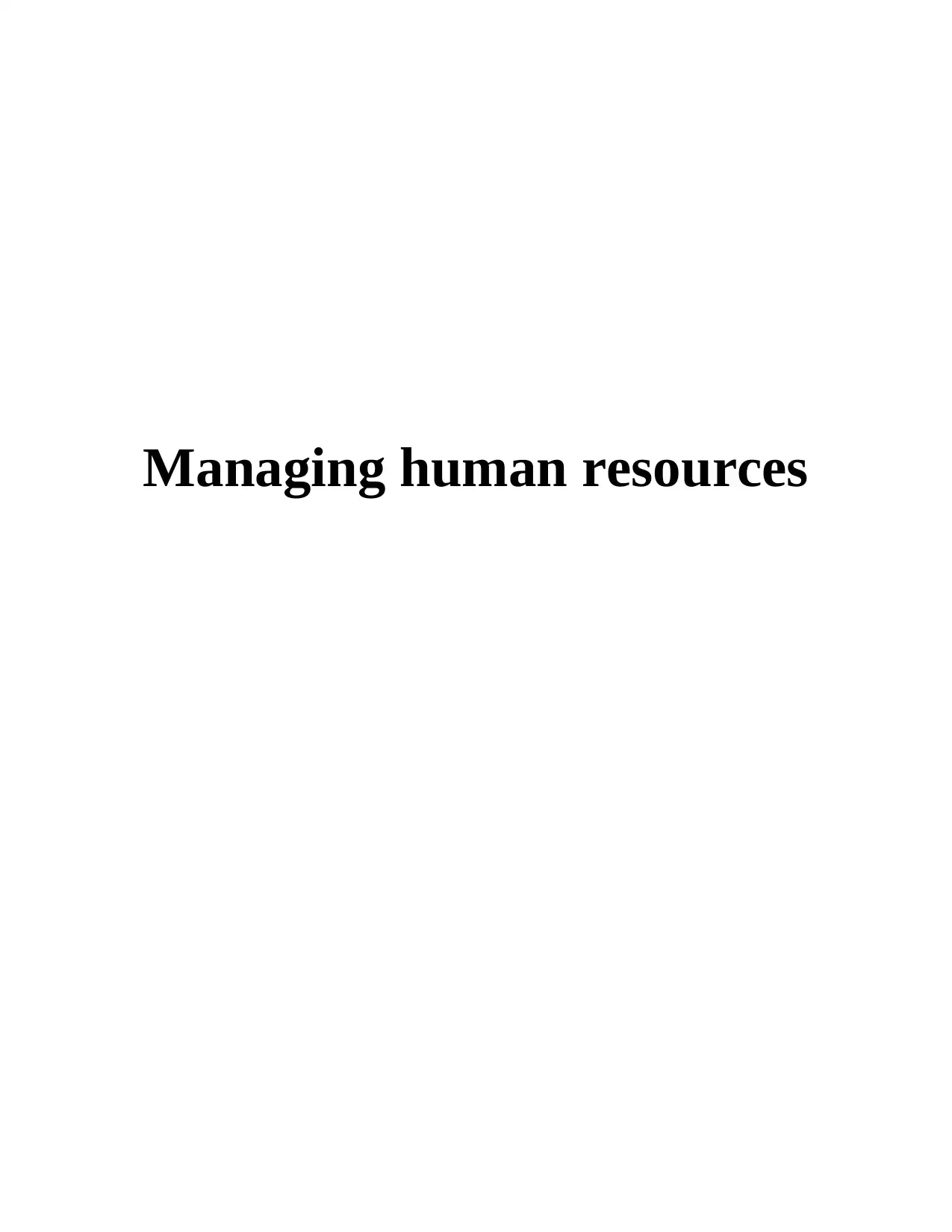
Managing human resources
Paraphrase This Document
Need a fresh take? Get an instant paraphrase of this document with our AI Paraphraser
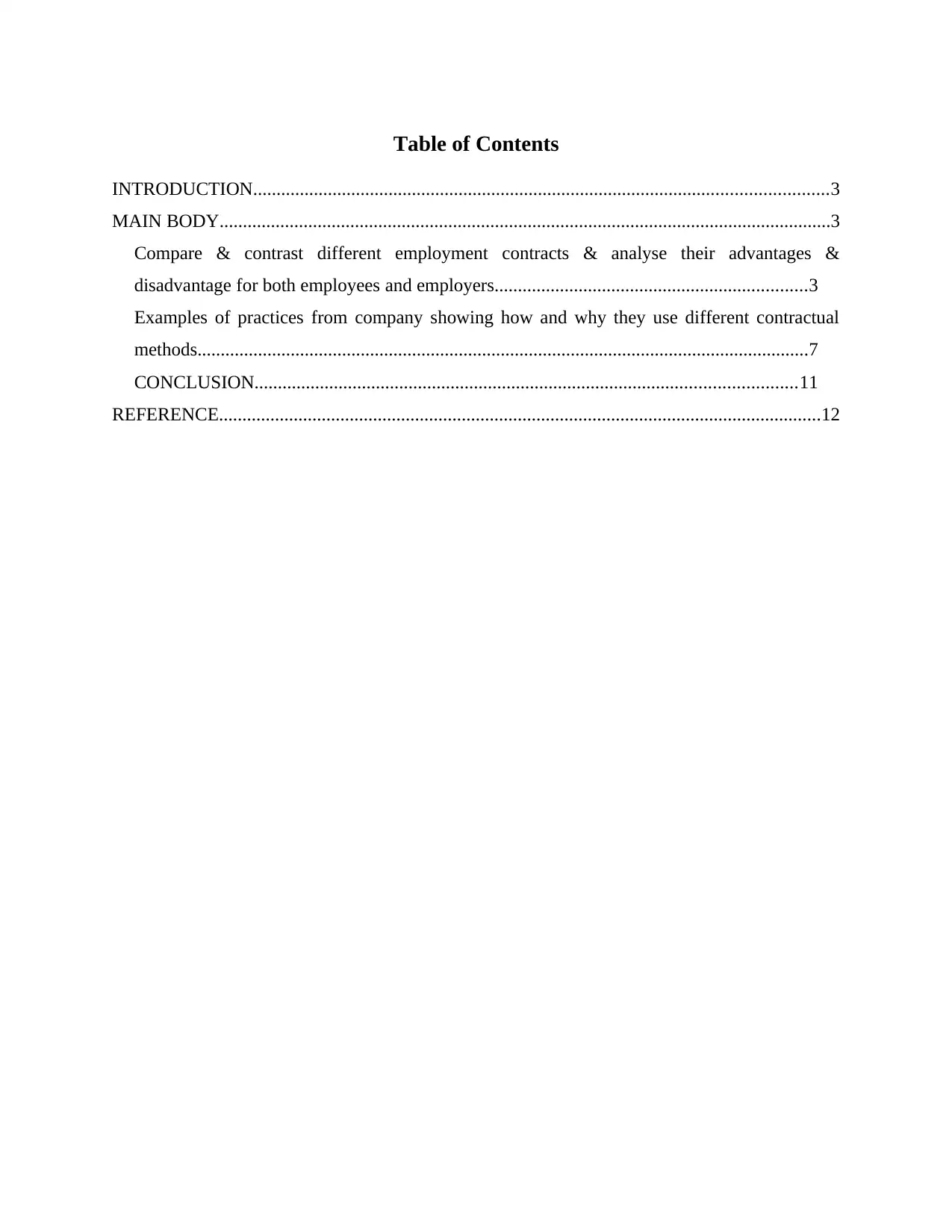
Table of Contents
INTRODUCTION...........................................................................................................................3
MAIN BODY...................................................................................................................................3
Compare & contrast different employment contracts & analyse their advantages &
disadvantage for both employees and employers...................................................................3
Examples of practices from company showing how and why they use different contractual
methods...................................................................................................................................7
CONCLUSION....................................................................................................................11
REFERENCE.................................................................................................................................12
INTRODUCTION...........................................................................................................................3
MAIN BODY...................................................................................................................................3
Compare & contrast different employment contracts & analyse their advantages &
disadvantage for both employees and employers...................................................................3
Examples of practices from company showing how and why they use different contractual
methods...................................................................................................................................7
CONCLUSION....................................................................................................................11
REFERENCE.................................................................................................................................12
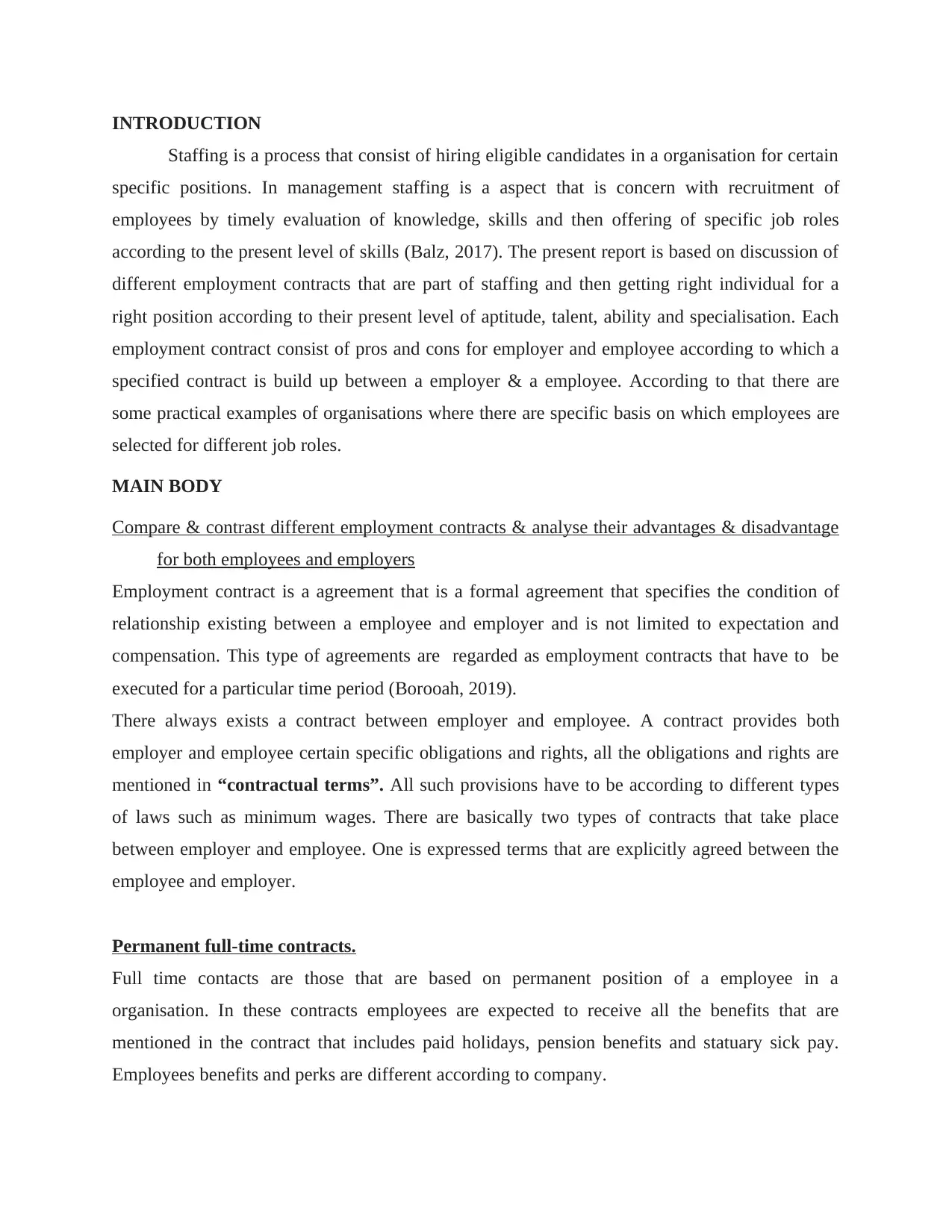
INTRODUCTION
Staffing is a process that consist of hiring eligible candidates in a organisation for certain
specific positions. In management staffing is a aspect that is concern with recruitment of
employees by timely evaluation of knowledge, skills and then offering of specific job roles
according to the present level of skills (Balz, 2017). The present report is based on discussion of
different employment contracts that are part of staffing and then getting right individual for a
right position according to their present level of aptitude, talent, ability and specialisation. Each
employment contract consist of pros and cons for employer and employee according to which a
specified contract is build up between a employer & a employee. According to that there are
some practical examples of organisations where there are specific basis on which employees are
selected for different job roles.
MAIN BODY
Compare & contrast different employment contracts & analyse their advantages & disadvantage
for both employees and employers
Employment contract is a agreement that is a formal agreement that specifies the condition of
relationship existing between a employee and employer and is not limited to expectation and
compensation. This type of agreements are regarded as employment contracts that have to be
executed for a particular time period (Borooah, 2019).
There always exists a contract between employer and employee. A contract provides both
employer and employee certain specific obligations and rights, all the obligations and rights are
mentioned in “contractual terms”. All such provisions have to be according to different types
of laws such as minimum wages. There are basically two types of contracts that take place
between employer and employee. One is expressed terms that are explicitly agreed between the
employee and employer.
Permanent full-time contracts.
Full time contacts are those that are based on permanent position of a employee in a
organisation. In these contracts employees are expected to receive all the benefits that are
mentioned in the contract that includes paid holidays, pension benefits and statuary sick pay.
Employees benefits and perks are different according to company.
Staffing is a process that consist of hiring eligible candidates in a organisation for certain
specific positions. In management staffing is a aspect that is concern with recruitment of
employees by timely evaluation of knowledge, skills and then offering of specific job roles
according to the present level of skills (Balz, 2017). The present report is based on discussion of
different employment contracts that are part of staffing and then getting right individual for a
right position according to their present level of aptitude, talent, ability and specialisation. Each
employment contract consist of pros and cons for employer and employee according to which a
specified contract is build up between a employer & a employee. According to that there are
some practical examples of organisations where there are specific basis on which employees are
selected for different job roles.
MAIN BODY
Compare & contrast different employment contracts & analyse their advantages & disadvantage
for both employees and employers
Employment contract is a agreement that is a formal agreement that specifies the condition of
relationship existing between a employee and employer and is not limited to expectation and
compensation. This type of agreements are regarded as employment contracts that have to be
executed for a particular time period (Borooah, 2019).
There always exists a contract between employer and employee. A contract provides both
employer and employee certain specific obligations and rights, all the obligations and rights are
mentioned in “contractual terms”. All such provisions have to be according to different types
of laws such as minimum wages. There are basically two types of contracts that take place
between employer and employee. One is expressed terms that are explicitly agreed between the
employee and employer.
Permanent full-time contracts.
Full time contacts are those that are based on permanent position of a employee in a
organisation. In these contracts employees are expected to receive all the benefits that are
mentioned in the contract that includes paid holidays, pension benefits and statuary sick pay.
Employees benefits and perks are different according to company.
⊘ This is a preview!⊘
Do you want full access?
Subscribe today to unlock all pages.

Trusted by 1+ million students worldwide
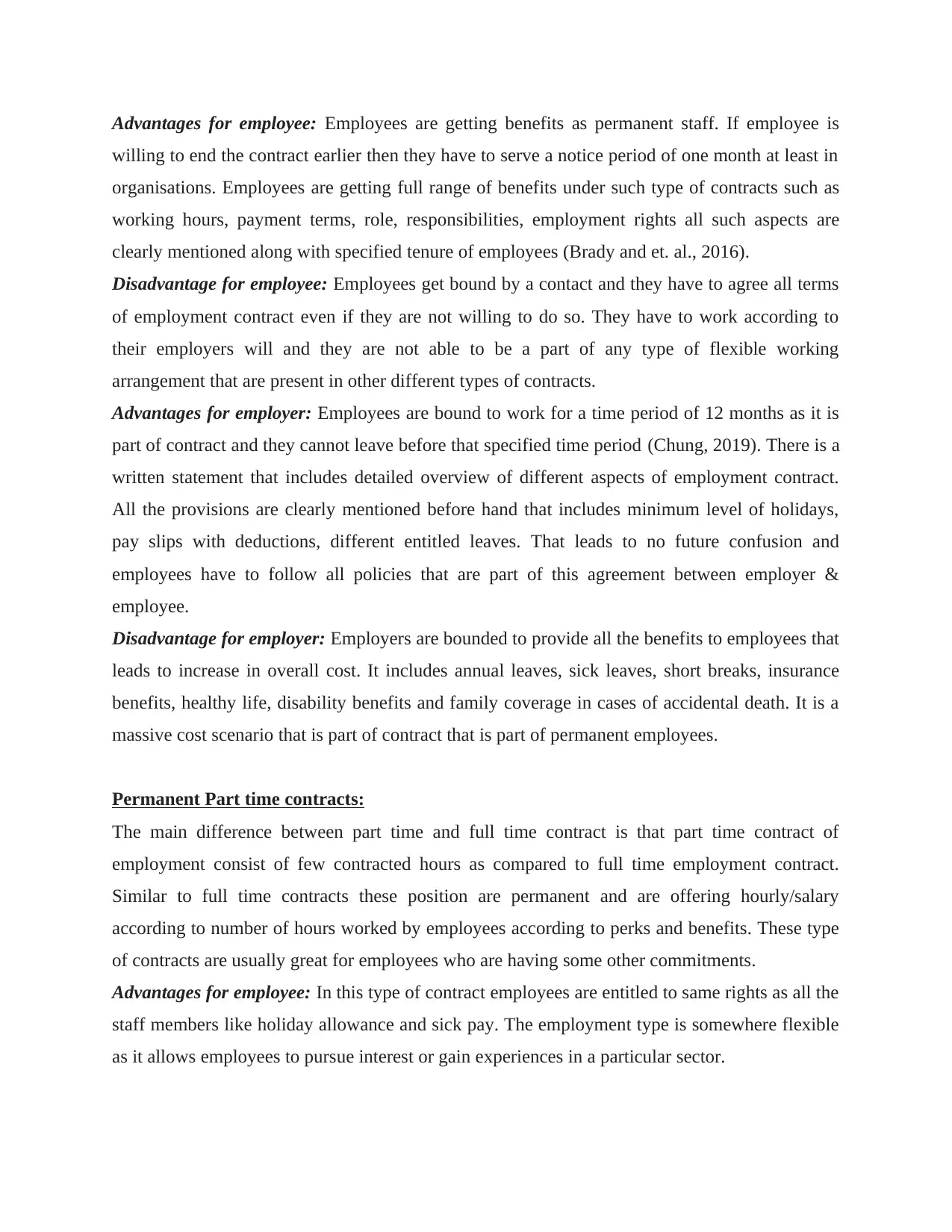
Advantages for employee: Employees are getting benefits as permanent staff. If employee is
willing to end the contract earlier then they have to serve a notice period of one month at least in
organisations. Employees are getting full range of benefits under such type of contracts such as
working hours, payment terms, role, responsibilities, employment rights all such aspects are
clearly mentioned along with specified tenure of employees (Brady and et. al., 2016).
Disadvantage for employee: Employees get bound by a contact and they have to agree all terms
of employment contract even if they are not willing to do so. They have to work according to
their employers will and they are not able to be a part of any type of flexible working
arrangement that are present in other different types of contracts.
Advantages for employer: Employees are bound to work for a time period of 12 months as it is
part of contract and they cannot leave before that specified time period (Chung, 2019). There is a
written statement that includes detailed overview of different aspects of employment contract.
All the provisions are clearly mentioned before hand that includes minimum level of holidays,
pay slips with deductions, different entitled leaves. That leads to no future confusion and
employees have to follow all policies that are part of this agreement between employer &
employee.
Disadvantage for employer: Employers are bounded to provide all the benefits to employees that
leads to increase in overall cost. It includes annual leaves, sick leaves, short breaks, insurance
benefits, healthy life, disability benefits and family coverage in cases of accidental death. It is a
massive cost scenario that is part of contract that is part of permanent employees.
Permanent Part time contracts:
The main difference between part time and full time contract is that part time contract of
employment consist of few contracted hours as compared to full time employment contract.
Similar to full time contracts these position are permanent and are offering hourly/salary
according to number of hours worked by employees according to perks and benefits. These type
of contracts are usually great for employees who are having some other commitments.
Advantages for employee: In this type of contract employees are entitled to same rights as all the
staff members like holiday allowance and sick pay. The employment type is somewhere flexible
as it allows employees to pursue interest or gain experiences in a particular sector.
willing to end the contract earlier then they have to serve a notice period of one month at least in
organisations. Employees are getting full range of benefits under such type of contracts such as
working hours, payment terms, role, responsibilities, employment rights all such aspects are
clearly mentioned along with specified tenure of employees (Brady and et. al., 2016).
Disadvantage for employee: Employees get bound by a contact and they have to agree all terms
of employment contract even if they are not willing to do so. They have to work according to
their employers will and they are not able to be a part of any type of flexible working
arrangement that are present in other different types of contracts.
Advantages for employer: Employees are bound to work for a time period of 12 months as it is
part of contract and they cannot leave before that specified time period (Chung, 2019). There is a
written statement that includes detailed overview of different aspects of employment contract.
All the provisions are clearly mentioned before hand that includes minimum level of holidays,
pay slips with deductions, different entitled leaves. That leads to no future confusion and
employees have to follow all policies that are part of this agreement between employer &
employee.
Disadvantage for employer: Employers are bounded to provide all the benefits to employees that
leads to increase in overall cost. It includes annual leaves, sick leaves, short breaks, insurance
benefits, healthy life, disability benefits and family coverage in cases of accidental death. It is a
massive cost scenario that is part of contract that is part of permanent employees.
Permanent Part time contracts:
The main difference between part time and full time contract is that part time contract of
employment consist of few contracted hours as compared to full time employment contract.
Similar to full time contracts these position are permanent and are offering hourly/salary
according to number of hours worked by employees according to perks and benefits. These type
of contracts are usually great for employees who are having some other commitments.
Advantages for employee: In this type of contract employees are entitled to same rights as all the
staff members like holiday allowance and sick pay. The employment type is somewhere flexible
as it allows employees to pursue interest or gain experiences in a particular sector.
Paraphrase This Document
Need a fresh take? Get an instant paraphrase of this document with our AI Paraphraser
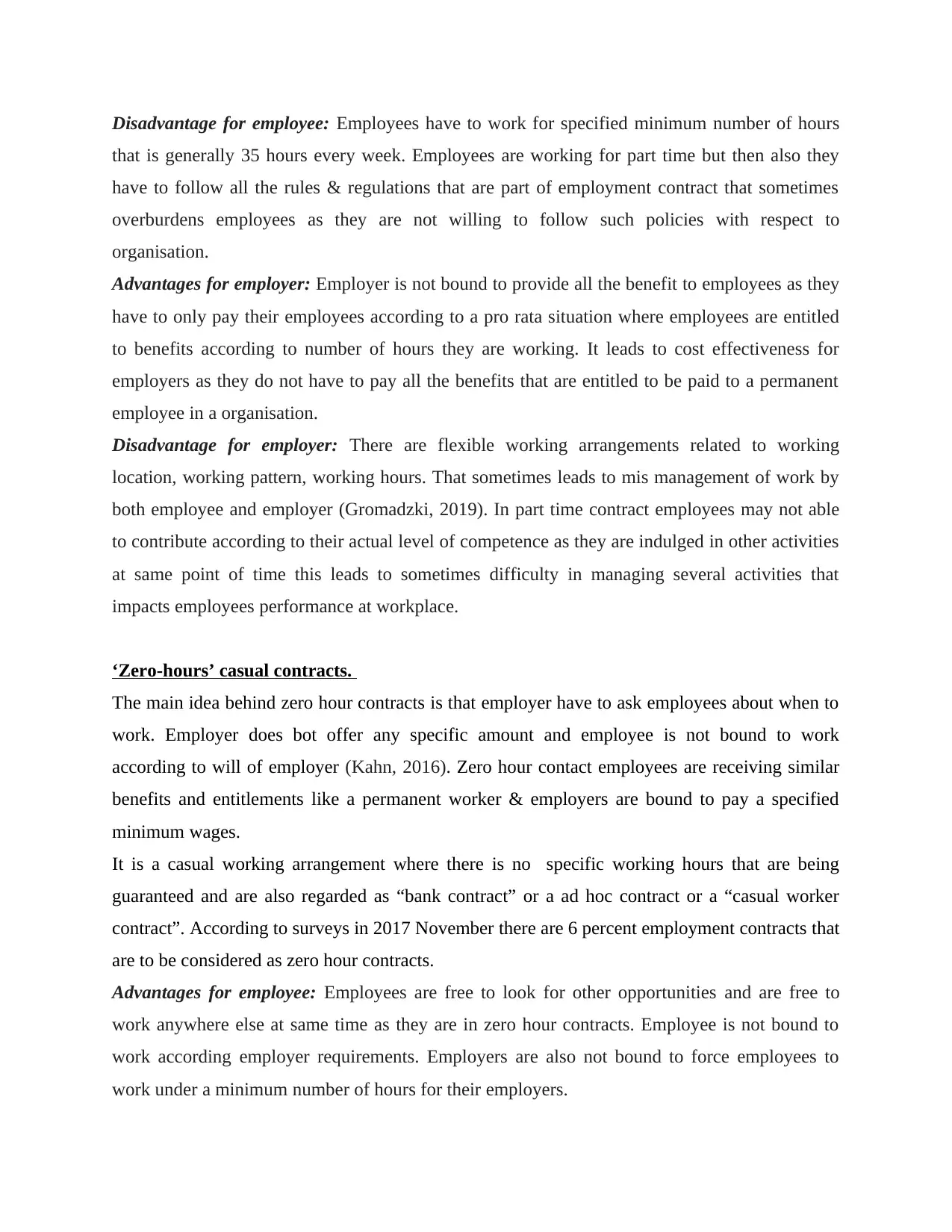
Disadvantage for employee: Employees have to work for specified minimum number of hours
that is generally 35 hours every week. Employees are working for part time but then also they
have to follow all the rules & regulations that are part of employment contract that sometimes
overburdens employees as they are not willing to follow such policies with respect to
organisation.
Advantages for employer: Employer is not bound to provide all the benefit to employees as they
have to only pay their employees according to a pro rata situation where employees are entitled
to benefits according to number of hours they are working. It leads to cost effectiveness for
employers as they do not have to pay all the benefits that are entitled to be paid to a permanent
employee in a organisation.
Disadvantage for employer: There are flexible working arrangements related to working
location, working pattern, working hours. That sometimes leads to mis management of work by
both employee and employer (Gromadzki, 2019). In part time contract employees may not able
to contribute according to their actual level of competence as they are indulged in other activities
at same point of time this leads to sometimes difficulty in managing several activities that
impacts employees performance at workplace.
‘Zero-hours’ casual contracts.
The main idea behind zero hour contracts is that employer have to ask employees about when to
work. Employer does bot offer any specific amount and employee is not bound to work
according to will of employer (Kahn, 2016). Zero hour contact employees are receiving similar
benefits and entitlements like a permanent worker & employers are bound to pay a specified
minimum wages.
It is a casual working arrangement where there is no specific working hours that are being
guaranteed and are also regarded as “bank contract” or a ad hoc contract or a “casual worker
contract”. According to surveys in 2017 November there are 6 percent employment contracts that
are to be considered as zero hour contracts.
Advantages for employee: Employees are free to look for other opportunities and are free to
work anywhere else at same time as they are in zero hour contracts. Employee is not bound to
work according employer requirements. Employers are also not bound to force employees to
work under a minimum number of hours for their employers.
that is generally 35 hours every week. Employees are working for part time but then also they
have to follow all the rules & regulations that are part of employment contract that sometimes
overburdens employees as they are not willing to follow such policies with respect to
organisation.
Advantages for employer: Employer is not bound to provide all the benefit to employees as they
have to only pay their employees according to a pro rata situation where employees are entitled
to benefits according to number of hours they are working. It leads to cost effectiveness for
employers as they do not have to pay all the benefits that are entitled to be paid to a permanent
employee in a organisation.
Disadvantage for employer: There are flexible working arrangements related to working
location, working pattern, working hours. That sometimes leads to mis management of work by
both employee and employer (Gromadzki, 2019). In part time contract employees may not able
to contribute according to their actual level of competence as they are indulged in other activities
at same point of time this leads to sometimes difficulty in managing several activities that
impacts employees performance at workplace.
‘Zero-hours’ casual contracts.
The main idea behind zero hour contracts is that employer have to ask employees about when to
work. Employer does bot offer any specific amount and employee is not bound to work
according to will of employer (Kahn, 2016). Zero hour contact employees are receiving similar
benefits and entitlements like a permanent worker & employers are bound to pay a specified
minimum wages.
It is a casual working arrangement where there is no specific working hours that are being
guaranteed and are also regarded as “bank contract” or a ad hoc contract or a “casual worker
contract”. According to surveys in 2017 November there are 6 percent employment contracts that
are to be considered as zero hour contracts.
Advantages for employee: Employees are free to look for other opportunities and are free to
work anywhere else at same time as they are in zero hour contracts. Employee is not bound to
work according employer requirements. Employers are also not bound to force employees to
work under a minimum number of hours for their employers.
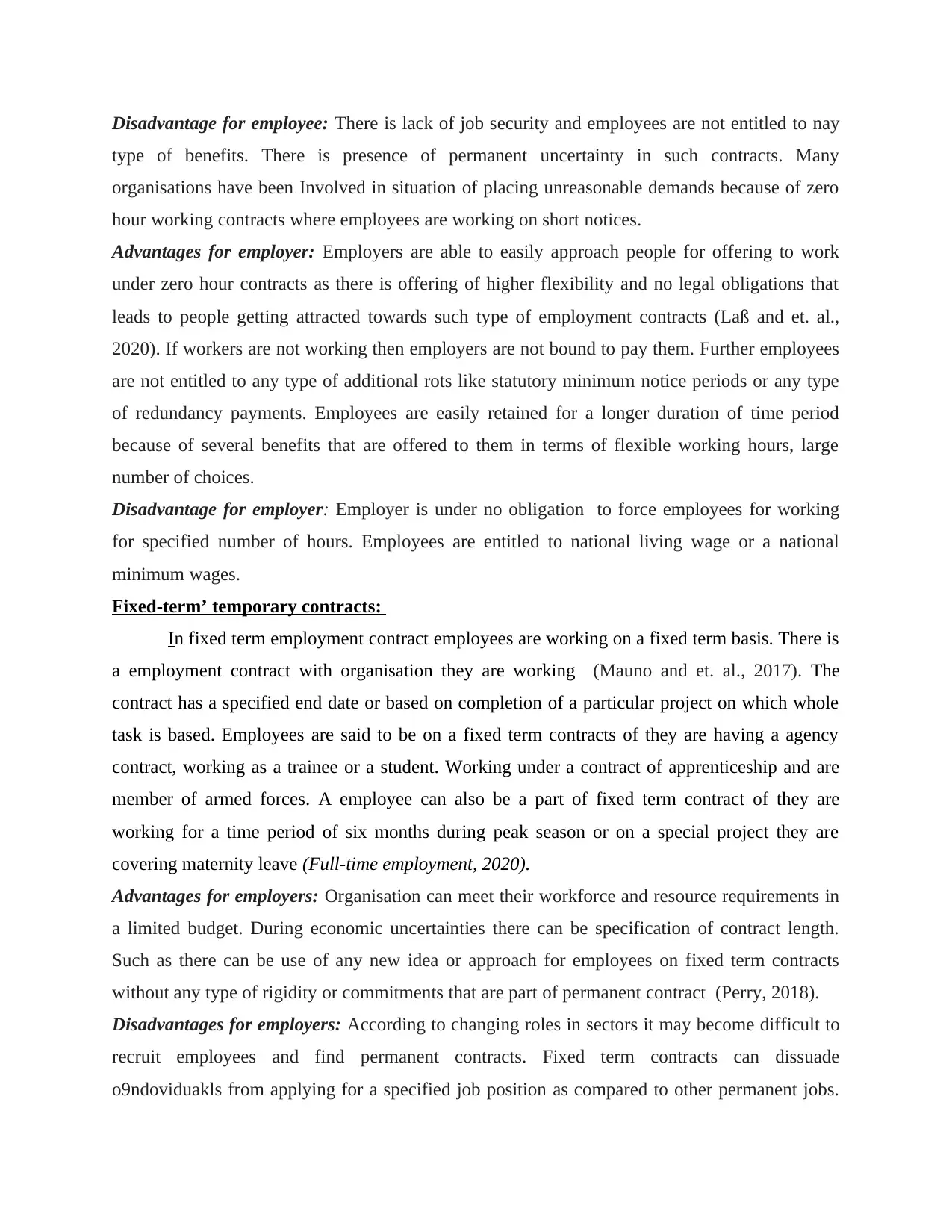
Disadvantage for employee: There is lack of job security and employees are not entitled to nay
type of benefits. There is presence of permanent uncertainty in such contracts. Many
organisations have been Involved in situation of placing unreasonable demands because of zero
hour working contracts where employees are working on short notices.
Advantages for employer: Employers are able to easily approach people for offering to work
under zero hour contracts as there is offering of higher flexibility and no legal obligations that
leads to people getting attracted towards such type of employment contracts (Laß and et. al.,
2020). If workers are not working then employers are not bound to pay them. Further employees
are not entitled to any type of additional rots like statutory minimum notice periods or any type
of redundancy payments. Employees are easily retained for a longer duration of time period
because of several benefits that are offered to them in terms of flexible working hours, large
number of choices.
Disadvantage for employer: Employer is under no obligation to force employees for working
for specified number of hours. Employees are entitled to national living wage or a national
minimum wages.
Fixed-term’ temporary contracts:
In fixed term employment contract employees are working on a fixed term basis. There is
a employment contract with organisation they are working (Mauno and et. al., 2017). The
contract has a specified end date or based on completion of a particular project on which whole
task is based. Employees are said to be on a fixed term contracts of they are having a agency
contract, working as a trainee or a student. Working under a contract of apprenticeship and are
member of armed forces. A employee can also be a part of fixed term contract of they are
working for a time period of six months during peak season or on a special project they are
covering maternity leave (Full-time employment, 2020).
Advantages for employers: Organisation can meet their workforce and resource requirements in
a limited budget. During economic uncertainties there can be specification of contract length.
Such as there can be use of any new idea or approach for employees on fixed term contracts
without any type of rigidity or commitments that are part of permanent contract (Perry, 2018).
Disadvantages for employers: According to changing roles in sectors it may become difficult to
recruit employees and find permanent contracts. Fixed term contracts can dissuade
o9ndoviduakls from applying for a specified job position as compared to other permanent jobs.
type of benefits. There is presence of permanent uncertainty in such contracts. Many
organisations have been Involved in situation of placing unreasonable demands because of zero
hour working contracts where employees are working on short notices.
Advantages for employer: Employers are able to easily approach people for offering to work
under zero hour contracts as there is offering of higher flexibility and no legal obligations that
leads to people getting attracted towards such type of employment contracts (Laß and et. al.,
2020). If workers are not working then employers are not bound to pay them. Further employees
are not entitled to any type of additional rots like statutory minimum notice periods or any type
of redundancy payments. Employees are easily retained for a longer duration of time period
because of several benefits that are offered to them in terms of flexible working hours, large
number of choices.
Disadvantage for employer: Employer is under no obligation to force employees for working
for specified number of hours. Employees are entitled to national living wage or a national
minimum wages.
Fixed-term’ temporary contracts:
In fixed term employment contract employees are working on a fixed term basis. There is
a employment contract with organisation they are working (Mauno and et. al., 2017). The
contract has a specified end date or based on completion of a particular project on which whole
task is based. Employees are said to be on a fixed term contracts of they are having a agency
contract, working as a trainee or a student. Working under a contract of apprenticeship and are
member of armed forces. A employee can also be a part of fixed term contract of they are
working for a time period of six months during peak season or on a special project they are
covering maternity leave (Full-time employment, 2020).
Advantages for employers: Organisation can meet their workforce and resource requirements in
a limited budget. During economic uncertainties there can be specification of contract length.
Such as there can be use of any new idea or approach for employees on fixed term contracts
without any type of rigidity or commitments that are part of permanent contract (Perry, 2018).
Disadvantages for employers: According to changing roles in sectors it may become difficult to
recruit employees and find permanent contracts. Fixed term contracts can dissuade
o9ndoviduakls from applying for a specified job position as compared to other permanent jobs.
⊘ This is a preview!⊘
Do you want full access?
Subscribe today to unlock all pages.

Trusted by 1+ million students worldwide
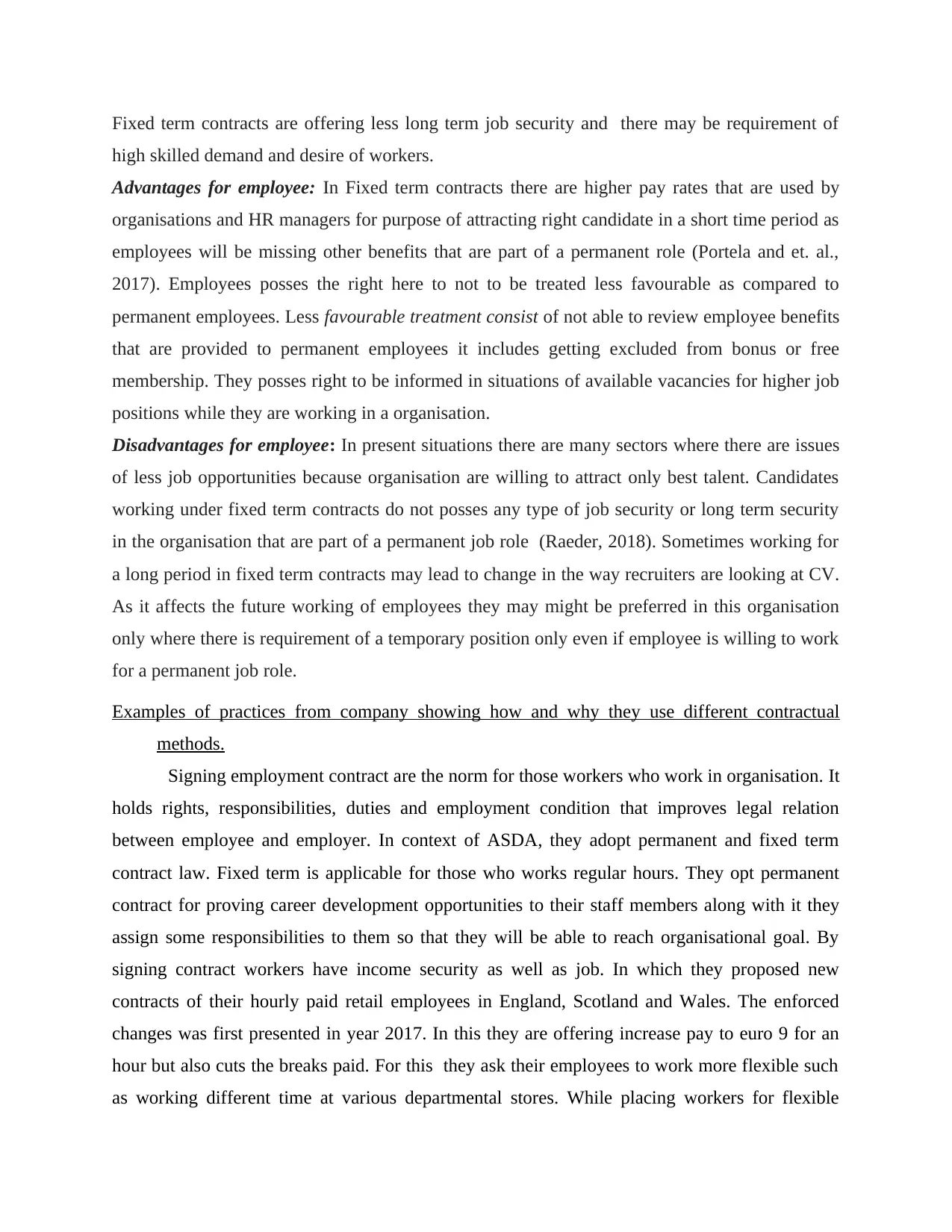
Fixed term contracts are offering less long term job security and there may be requirement of
high skilled demand and desire of workers.
Advantages for employee: In Fixed term contracts there are higher pay rates that are used by
organisations and HR managers for purpose of attracting right candidate in a short time period as
employees will be missing other benefits that are part of a permanent role (Portela and et. al.,
2017). Employees posses the right here to not to be treated less favourable as compared to
permanent employees. Less favourable treatment consist of not able to review employee benefits
that are provided to permanent employees it includes getting excluded from bonus or free
membership. They posses right to be informed in situations of available vacancies for higher job
positions while they are working in a organisation.
Disadvantages for employee: In present situations there are many sectors where there are issues
of less job opportunities because organisation are willing to attract only best talent. Candidates
working under fixed term contracts do not posses any type of job security or long term security
in the organisation that are part of a permanent job role (Raeder, 2018). Sometimes working for
a long period in fixed term contracts may lead to change in the way recruiters are looking at CV.
As it affects the future working of employees they may might be preferred in this organisation
only where there is requirement of a temporary position only even if employee is willing to work
for a permanent job role.
Examples of practices from company showing how and why they use different contractual
methods.
Signing employment contract are the norm for those workers who work in organisation. It
holds rights, responsibilities, duties and employment condition that improves legal relation
between employee and employer. In context of ASDA, they adopt permanent and fixed term
contract law. Fixed term is applicable for those who works regular hours. They opt permanent
contract for proving career development opportunities to their staff members along with it they
assign some responsibilities to them so that they will be able to reach organisational goal. By
signing contract workers have income security as well as job. In which they proposed new
contracts of their hourly paid retail employees in England, Scotland and Wales. The enforced
changes was first presented in year 2017. In this they are offering increase pay to euro 9 for an
hour but also cuts the breaks paid. For this they ask their employees to work more flexible such
as working different time at various departmental stores. While placing workers for flexible
high skilled demand and desire of workers.
Advantages for employee: In Fixed term contracts there are higher pay rates that are used by
organisations and HR managers for purpose of attracting right candidate in a short time period as
employees will be missing other benefits that are part of a permanent role (Portela and et. al.,
2017). Employees posses the right here to not to be treated less favourable as compared to
permanent employees. Less favourable treatment consist of not able to review employee benefits
that are provided to permanent employees it includes getting excluded from bonus or free
membership. They posses right to be informed in situations of available vacancies for higher job
positions while they are working in a organisation.
Disadvantages for employee: In present situations there are many sectors where there are issues
of less job opportunities because organisation are willing to attract only best talent. Candidates
working under fixed term contracts do not posses any type of job security or long term security
in the organisation that are part of a permanent job role (Raeder, 2018). Sometimes working for
a long period in fixed term contracts may lead to change in the way recruiters are looking at CV.
As it affects the future working of employees they may might be preferred in this organisation
only where there is requirement of a temporary position only even if employee is willing to work
for a permanent job role.
Examples of practices from company showing how and why they use different contractual
methods.
Signing employment contract are the norm for those workers who work in organisation. It
holds rights, responsibilities, duties and employment condition that improves legal relation
between employee and employer. In context of ASDA, they adopt permanent and fixed term
contract law. Fixed term is applicable for those who works regular hours. They opt permanent
contract for proving career development opportunities to their staff members along with it they
assign some responsibilities to them so that they will be able to reach organisational goal. By
signing contract workers have income security as well as job. In which they proposed new
contracts of their hourly paid retail employees in England, Scotland and Wales. The enforced
changes was first presented in year 2017. In this they are offering increase pay to euro 9 for an
hour but also cuts the breaks paid. For this they ask their employees to work more flexible such
as working different time at various departmental stores. While placing workers for flexible
Paraphrase This Document
Need a fresh take? Get an instant paraphrase of this document with our AI Paraphraser
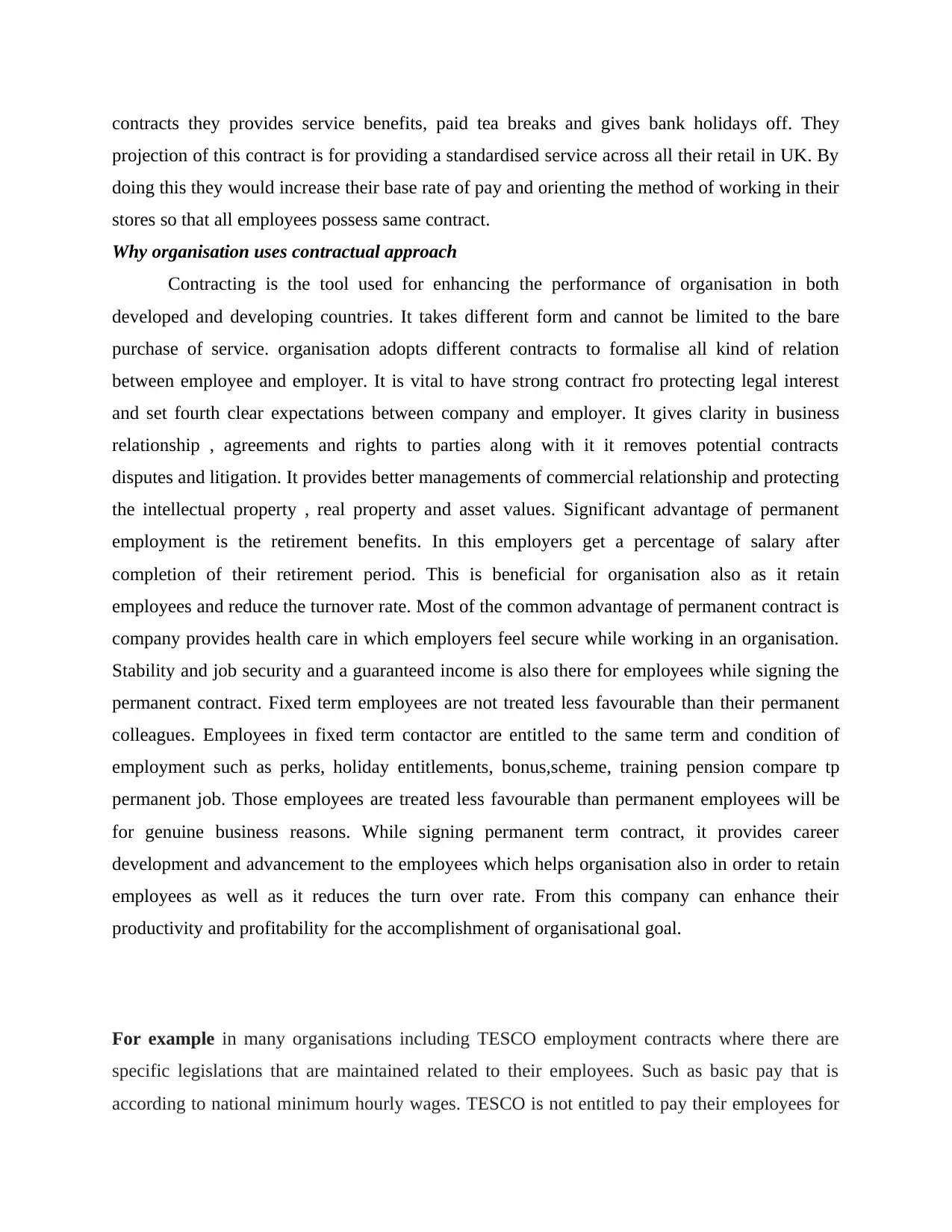
contracts they provides service benefits, paid tea breaks and gives bank holidays off. They
projection of this contract is for providing a standardised service across all their retail in UK. By
doing this they would increase their base rate of pay and orienting the method of working in their
stores so that all employees possess same contract.
Why organisation uses contractual approach
Contracting is the tool used for enhancing the performance of organisation in both
developed and developing countries. It takes different form and cannot be limited to the bare
purchase of service. organisation adopts different contracts to formalise all kind of relation
between employee and employer. It is vital to have strong contract fro protecting legal interest
and set fourth clear expectations between company and employer. It gives clarity in business
relationship , agreements and rights to parties along with it it removes potential contracts
disputes and litigation. It provides better managements of commercial relationship and protecting
the intellectual property , real property and asset values. Significant advantage of permanent
employment is the retirement benefits. In this employers get a percentage of salary after
completion of their retirement period. This is beneficial for organisation also as it retain
employees and reduce the turnover rate. Most of the common advantage of permanent contract is
company provides health care in which employers feel secure while working in an organisation.
Stability and job security and a guaranteed income is also there for employees while signing the
permanent contract. Fixed term employees are not treated less favourable than their permanent
colleagues. Employees in fixed term contactor are entitled to the same term and condition of
employment such as perks, holiday entitlements, bonus,scheme, training pension compare tp
permanent job. Those employees are treated less favourable than permanent employees will be
for genuine business reasons. While signing permanent term contract, it provides career
development and advancement to the employees which helps organisation also in order to retain
employees as well as it reduces the turn over rate. From this company can enhance their
productivity and profitability for the accomplishment of organisational goal.
For example in many organisations including TESCO employment contracts where there are
specific legislations that are maintained related to their employees. Such as basic pay that is
according to national minimum hourly wages. TESCO is not entitled to pay their employees for
projection of this contract is for providing a standardised service across all their retail in UK. By
doing this they would increase their base rate of pay and orienting the method of working in their
stores so that all employees possess same contract.
Why organisation uses contractual approach
Contracting is the tool used for enhancing the performance of organisation in both
developed and developing countries. It takes different form and cannot be limited to the bare
purchase of service. organisation adopts different contracts to formalise all kind of relation
between employee and employer. It is vital to have strong contract fro protecting legal interest
and set fourth clear expectations between company and employer. It gives clarity in business
relationship , agreements and rights to parties along with it it removes potential contracts
disputes and litigation. It provides better managements of commercial relationship and protecting
the intellectual property , real property and asset values. Significant advantage of permanent
employment is the retirement benefits. In this employers get a percentage of salary after
completion of their retirement period. This is beneficial for organisation also as it retain
employees and reduce the turnover rate. Most of the common advantage of permanent contract is
company provides health care in which employers feel secure while working in an organisation.
Stability and job security and a guaranteed income is also there for employees while signing the
permanent contract. Fixed term employees are not treated less favourable than their permanent
colleagues. Employees in fixed term contactor are entitled to the same term and condition of
employment such as perks, holiday entitlements, bonus,scheme, training pension compare tp
permanent job. Those employees are treated less favourable than permanent employees will be
for genuine business reasons. While signing permanent term contract, it provides career
development and advancement to the employees which helps organisation also in order to retain
employees as well as it reduces the turn over rate. From this company can enhance their
productivity and profitability for the accomplishment of organisational goal.
For example in many organisations including TESCO employment contracts where there are
specific legislations that are maintained related to their employees. Such as basic pay that is
according to national minimum hourly wages. TESCO is not entitled to pay their employees for
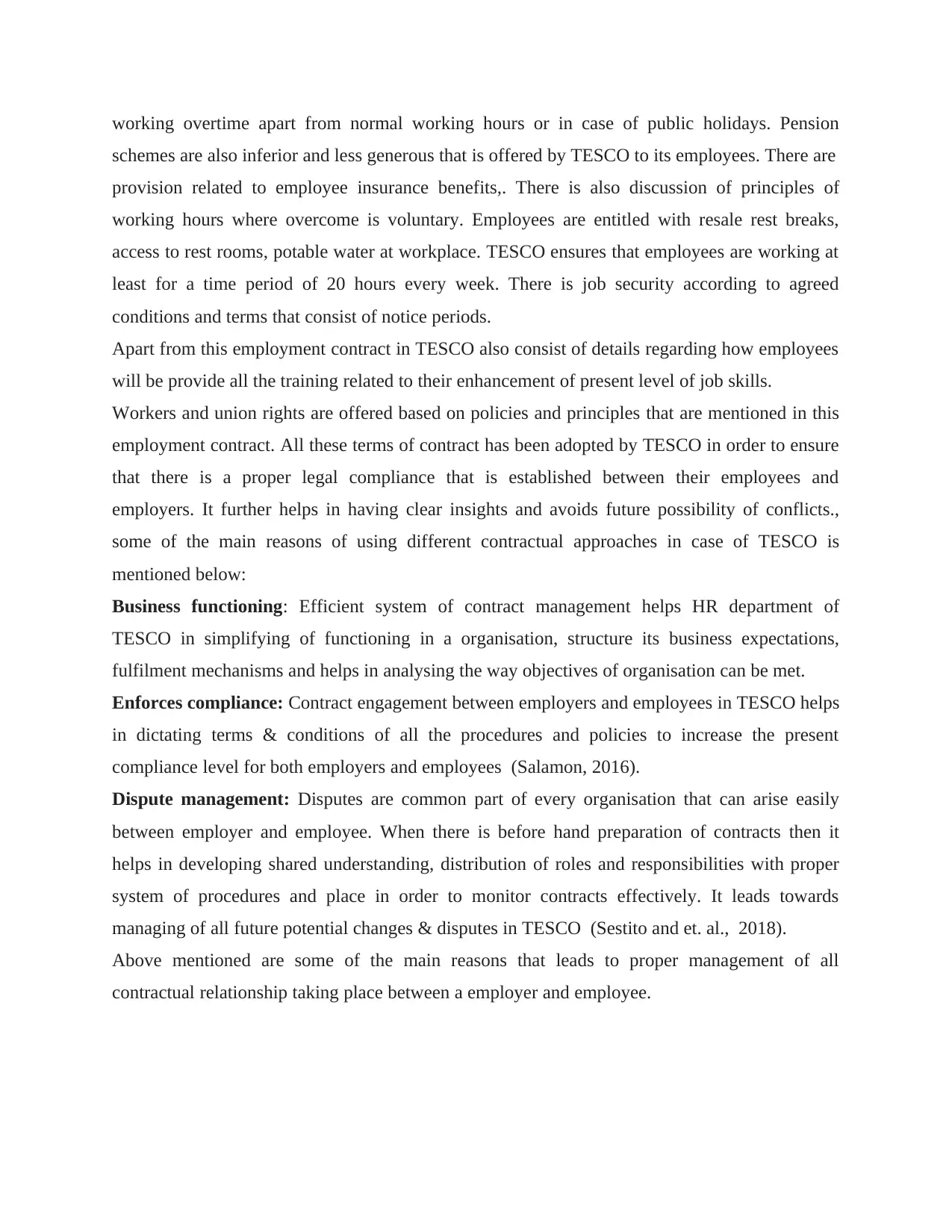
working overtime apart from normal working hours or in case of public holidays. Pension
schemes are also inferior and less generous that is offered by TESCO to its employees. There are
provision related to employee insurance benefits,. There is also discussion of principles of
working hours where overcome is voluntary. Employees are entitled with resale rest breaks,
access to rest rooms, potable water at workplace. TESCO ensures that employees are working at
least for a time period of 20 hours every week. There is job security according to agreed
conditions and terms that consist of notice periods.
Apart from this employment contract in TESCO also consist of details regarding how employees
will be provide all the training related to their enhancement of present level of job skills.
Workers and union rights are offered based on policies and principles that are mentioned in this
employment contract. All these terms of contract has been adopted by TESCO in order to ensure
that there is a proper legal compliance that is established between their employees and
employers. It further helps in having clear insights and avoids future possibility of conflicts.,
some of the main reasons of using different contractual approaches in case of TESCO is
mentioned below:
Business functioning: Efficient system of contract management helps HR department of
TESCO in simplifying of functioning in a organisation, structure its business expectations,
fulfilment mechanisms and helps in analysing the way objectives of organisation can be met.
Enforces compliance: Contract engagement between employers and employees in TESCO helps
in dictating terms & conditions of all the procedures and policies to increase the present
compliance level for both employers and employees (Salamon, 2016).
Dispute management: Disputes are common part of every organisation that can arise easily
between employer and employee. When there is before hand preparation of contracts then it
helps in developing shared understanding, distribution of roles and responsibilities with proper
system of procedures and place in order to monitor contracts effectively. It leads towards
managing of all future potential changes & disputes in TESCO (Sestito and et. al., 2018).
Above mentioned are some of the main reasons that leads to proper management of all
contractual relationship taking place between a employer and employee.
schemes are also inferior and less generous that is offered by TESCO to its employees. There are
provision related to employee insurance benefits,. There is also discussion of principles of
working hours where overcome is voluntary. Employees are entitled with resale rest breaks,
access to rest rooms, potable water at workplace. TESCO ensures that employees are working at
least for a time period of 20 hours every week. There is job security according to agreed
conditions and terms that consist of notice periods.
Apart from this employment contract in TESCO also consist of details regarding how employees
will be provide all the training related to their enhancement of present level of job skills.
Workers and union rights are offered based on policies and principles that are mentioned in this
employment contract. All these terms of contract has been adopted by TESCO in order to ensure
that there is a proper legal compliance that is established between their employees and
employers. It further helps in having clear insights and avoids future possibility of conflicts.,
some of the main reasons of using different contractual approaches in case of TESCO is
mentioned below:
Business functioning: Efficient system of contract management helps HR department of
TESCO in simplifying of functioning in a organisation, structure its business expectations,
fulfilment mechanisms and helps in analysing the way objectives of organisation can be met.
Enforces compliance: Contract engagement between employers and employees in TESCO helps
in dictating terms & conditions of all the procedures and policies to increase the present
compliance level for both employers and employees (Salamon, 2016).
Dispute management: Disputes are common part of every organisation that can arise easily
between employer and employee. When there is before hand preparation of contracts then it
helps in developing shared understanding, distribution of roles and responsibilities with proper
system of procedures and place in order to monitor contracts effectively. It leads towards
managing of all future potential changes & disputes in TESCO (Sestito and et. al., 2018).
Above mentioned are some of the main reasons that leads to proper management of all
contractual relationship taking place between a employer and employee.
⊘ This is a preview!⊘
Do you want full access?
Subscribe today to unlock all pages.

Trusted by 1+ million students worldwide
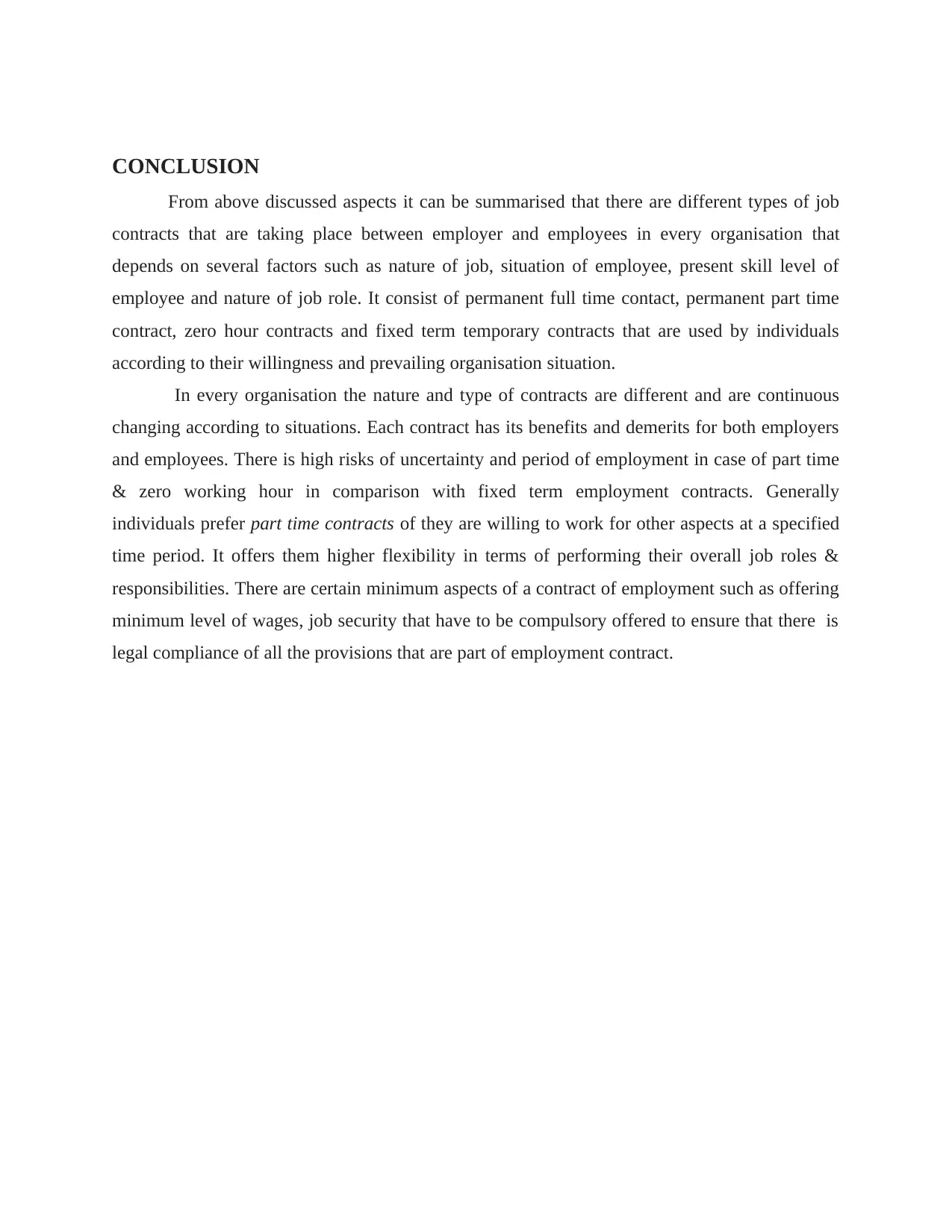
CONCLUSION
From above discussed aspects it can be summarised that there are different types of job
contracts that are taking place between employer and employees in every organisation that
depends on several factors such as nature of job, situation of employee, present skill level of
employee and nature of job role. It consist of permanent full time contact, permanent part time
contract, zero hour contracts and fixed term temporary contracts that are used by individuals
according to their willingness and prevailing organisation situation.
In every organisation the nature and type of contracts are different and are continuous
changing according to situations. Each contract has its benefits and demerits for both employers
and employees. There is high risks of uncertainty and period of employment in case of part time
& zero working hour in comparison with fixed term employment contracts. Generally
individuals prefer part time contracts of they are willing to work for other aspects at a specified
time period. It offers them higher flexibility in terms of performing their overall job roles &
responsibilities. There are certain minimum aspects of a contract of employment such as offering
minimum level of wages, job security that have to be compulsory offered to ensure that there is
legal compliance of all the provisions that are part of employment contract.
From above discussed aspects it can be summarised that there are different types of job
contracts that are taking place between employer and employees in every organisation that
depends on several factors such as nature of job, situation of employee, present skill level of
employee and nature of job role. It consist of permanent full time contact, permanent part time
contract, zero hour contracts and fixed term temporary contracts that are used by individuals
according to their willingness and prevailing organisation situation.
In every organisation the nature and type of contracts are different and are continuous
changing according to situations. Each contract has its benefits and demerits for both employers
and employees. There is high risks of uncertainty and period of employment in case of part time
& zero working hour in comparison with fixed term employment contracts. Generally
individuals prefer part time contracts of they are willing to work for other aspects at a specified
time period. It offers them higher flexibility in terms of performing their overall job roles &
responsibilities. There are certain minimum aspects of a contract of employment such as offering
minimum level of wages, job security that have to be compulsory offered to ensure that there is
legal compliance of all the provisions that are part of employment contract.
Paraphrase This Document
Need a fresh take? Get an instant paraphrase of this document with our AI Paraphraser
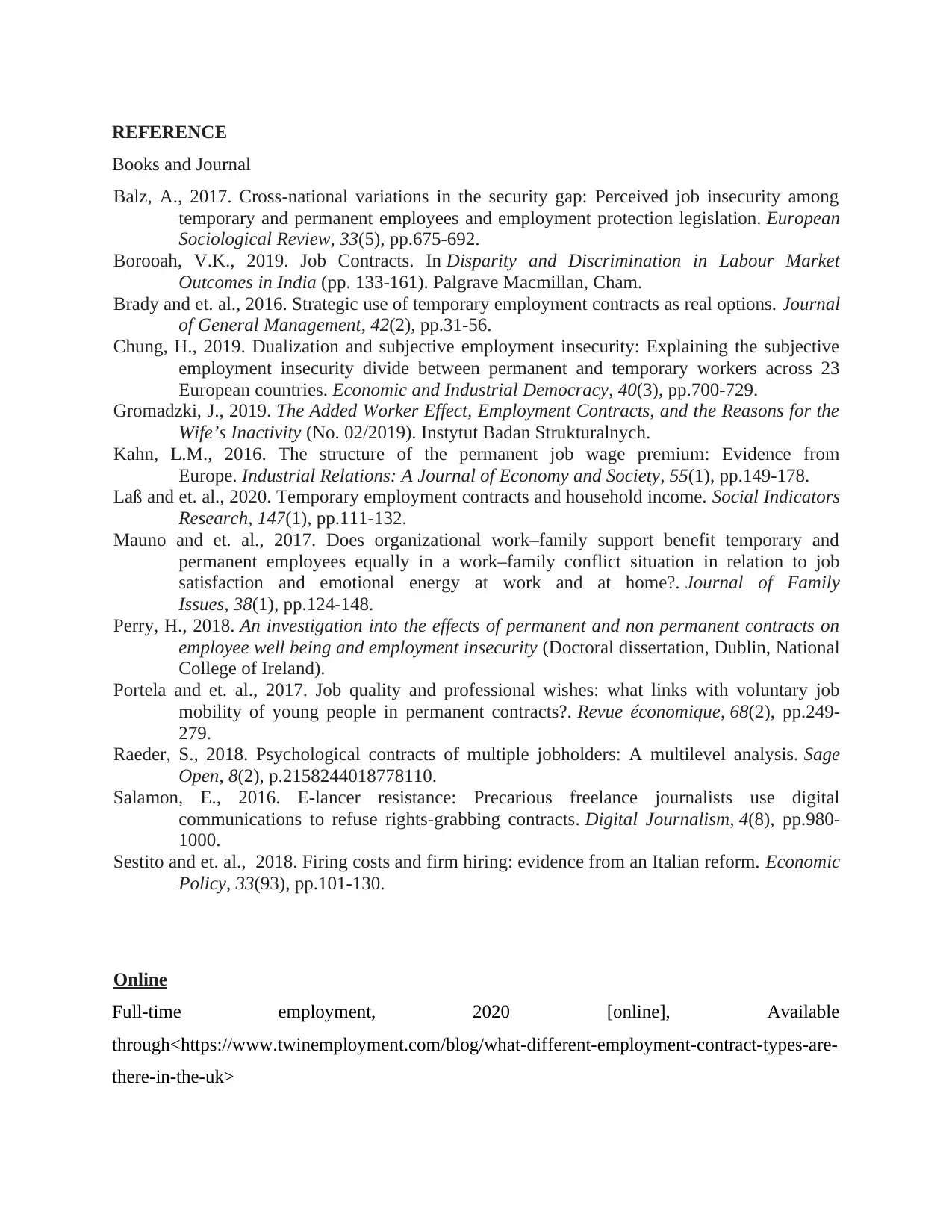
REFERENCE
Books and Journal
Balz, A., 2017. Cross-national variations in the security gap: Perceived job insecurity among
temporary and permanent employees and employment protection legislation. European
Sociological Review, 33(5), pp.675-692.
Borooah, V.K., 2019. Job Contracts. In Disparity and Discrimination in Labour Market
Outcomes in India (pp. 133-161). Palgrave Macmillan, Cham.
Brady and et. al., 2016. Strategic use of temporary employment contracts as real options. Journal
of General Management, 42(2), pp.31-56.
Chung, H., 2019. Dualization and subjective employment insecurity: Explaining the subjective
employment insecurity divide between permanent and temporary workers across 23
European countries. Economic and Industrial Democracy, 40(3), pp.700-729.
Gromadzki, J., 2019. The Added Worker Effect, Employment Contracts, and the Reasons for the
Wife’s Inactivity (No. 02/2019). Instytut Badan Strukturalnych.
Kahn, L.M., 2016. The structure of the permanent job wage premium: Evidence from
Europe. Industrial Relations: A Journal of Economy and Society, 55(1), pp.149-178.
Laß and et. al., 2020. Temporary employment contracts and household income. Social Indicators
Research, 147(1), pp.111-132.
Mauno and et. al., 2017. Does organizational work–family support benefit temporary and
permanent employees equally in a work–family conflict situation in relation to job
satisfaction and emotional energy at work and at home?. Journal of Family
Issues, 38(1), pp.124-148.
Perry, H., 2018. An investigation into the effects of permanent and non permanent contracts on
employee well being and employment insecurity (Doctoral dissertation, Dublin, National
College of Ireland).
Portela and et. al., 2017. Job quality and professional wishes: what links with voluntary job
mobility of young people in permanent contracts?. Revue économique, 68(2), pp.249-
279.
Raeder, S., 2018. Psychological contracts of multiple jobholders: A multilevel analysis. Sage
Open, 8(2), p.2158244018778110.
Salamon, E., 2016. E-lancer resistance: Precarious freelance journalists use digital
communications to refuse rights-grabbing contracts. Digital Journalism, 4(8), pp.980-
1000.
Sestito and et. al., 2018. Firing costs and firm hiring: evidence from an Italian reform. Economic
Policy, 33(93), pp.101-130.
Online
Full-time employment, 2020 [online], Available
through<https://www.twinemployment.com/blog/what-different-employment-contract-types-are-
there-in-the-uk>
Books and Journal
Balz, A., 2017. Cross-national variations in the security gap: Perceived job insecurity among
temporary and permanent employees and employment protection legislation. European
Sociological Review, 33(5), pp.675-692.
Borooah, V.K., 2019. Job Contracts. In Disparity and Discrimination in Labour Market
Outcomes in India (pp. 133-161). Palgrave Macmillan, Cham.
Brady and et. al., 2016. Strategic use of temporary employment contracts as real options. Journal
of General Management, 42(2), pp.31-56.
Chung, H., 2019. Dualization and subjective employment insecurity: Explaining the subjective
employment insecurity divide between permanent and temporary workers across 23
European countries. Economic and Industrial Democracy, 40(3), pp.700-729.
Gromadzki, J., 2019. The Added Worker Effect, Employment Contracts, and the Reasons for the
Wife’s Inactivity (No. 02/2019). Instytut Badan Strukturalnych.
Kahn, L.M., 2016. The structure of the permanent job wage premium: Evidence from
Europe. Industrial Relations: A Journal of Economy and Society, 55(1), pp.149-178.
Laß and et. al., 2020. Temporary employment contracts and household income. Social Indicators
Research, 147(1), pp.111-132.
Mauno and et. al., 2017. Does organizational work–family support benefit temporary and
permanent employees equally in a work–family conflict situation in relation to job
satisfaction and emotional energy at work and at home?. Journal of Family
Issues, 38(1), pp.124-148.
Perry, H., 2018. An investigation into the effects of permanent and non permanent contracts on
employee well being and employment insecurity (Doctoral dissertation, Dublin, National
College of Ireland).
Portela and et. al., 2017. Job quality and professional wishes: what links with voluntary job
mobility of young people in permanent contracts?. Revue économique, 68(2), pp.249-
279.
Raeder, S., 2018. Psychological contracts of multiple jobholders: A multilevel analysis. Sage
Open, 8(2), p.2158244018778110.
Salamon, E., 2016. E-lancer resistance: Precarious freelance journalists use digital
communications to refuse rights-grabbing contracts. Digital Journalism, 4(8), pp.980-
1000.
Sestito and et. al., 2018. Firing costs and firm hiring: evidence from an Italian reform. Economic
Policy, 33(93), pp.101-130.
Online
Full-time employment, 2020 [online], Available
through<https://www.twinemployment.com/blog/what-different-employment-contract-types-are-
there-in-the-uk>
1 out of 11
Related Documents
Your All-in-One AI-Powered Toolkit for Academic Success.
+13062052269
info@desklib.com
Available 24*7 on WhatsApp / Email
![[object Object]](/_next/static/media/star-bottom.7253800d.svg)
Unlock your academic potential
Copyright © 2020–2026 A2Z Services. All Rights Reserved. Developed and managed by ZUCOL.





